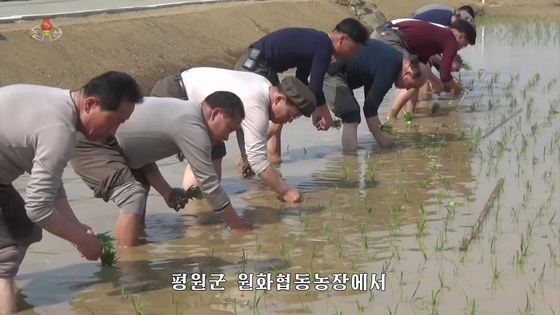North enforces crackdown during rice-planting season… Forced labor for offenders

Amid the height of the rice-planting season, an intensive crackdown is reportedly underway. Part of the regime’s broader effort to maintain social order, the season provides an opportunity for authorities to strictly control the activities of ordinary citizens.
North Korea launches this kind of crackdown in conjunction with the “rice-planting battle” every year. Officials use it to underscore the importance of planting rice while creating an atmosphere of tension.
According to an NK Times source inside North Korea, reached on May 19, the hours from 9:00 a.m. to 12:00 p.m. and from 1:00 p.m. to 5:00 p.m. have been designated as restricted periods during which free movement outdoors is prohibited.
Special squads from the Social Safety Departments of each city and county, as well as local police patrols and university student inspection squads roam around at these times. They are reported to be stopping residents who are out on the streets and major roads during restricted hours and carting them off to work on nearby farms.
In Sariwon, North Hwanghae Province, university inspection squads from Sariwon Industrial University and Sariwon Geological Exploration University are said to be patrolling the streets and alleyways, targeting students and young people.
![Inspection group | nk insider North Korean university inspection squad. [Photo / NK Times]](https://www.nkinsider.org/wp-content/uploads/2025/05/Inspection-group-1024x669.jpg)
north korean university inspection squad photo nk times
City Security Department Special Mobile Forces are said to be conducting mobile crackdowns across cities and counties everywhere. Meanwhile, patrols affiliated with local police stations are detaining residents and youths within their jurisdictions, forcing them to nearby farms to transplant rice seedlings for at least three hours before sending them back home.
The intensive crackdowns during rice-planting is nothing new. With chronic economic hardship and poor rural conditions accelerating the exodus of young people, the shortage of farming labor is said to have reached a critical level. This, the source explained, is why the authorities are fixated on the crackdowns.
“Recently, the regime has prioritized the supply of modern agricultural machinery, fertilizer, and fuel,” the source said. “There is a shortage of trained personnel to operate the machines, so even the newest equipment is not being used efficiently.”
“Farmers are taking the lead in rice planting, but manpower is still in short supply,” he said. “And because those being rounded up have no farming experience and were forcibly dragged there, they don’t work with any sense of ownership. This severely limits the effectiveness of the whole effort.”
- Pressure on all citizens to supply fertilizer creates a clandestine trade - January 9, 2026
- New system for distribution grain to farmers based on performance, Not everyone is happy - December 13, 2025
- Party to hold annual review meetings early this year… Members fear public criticism - December 4, 2025

